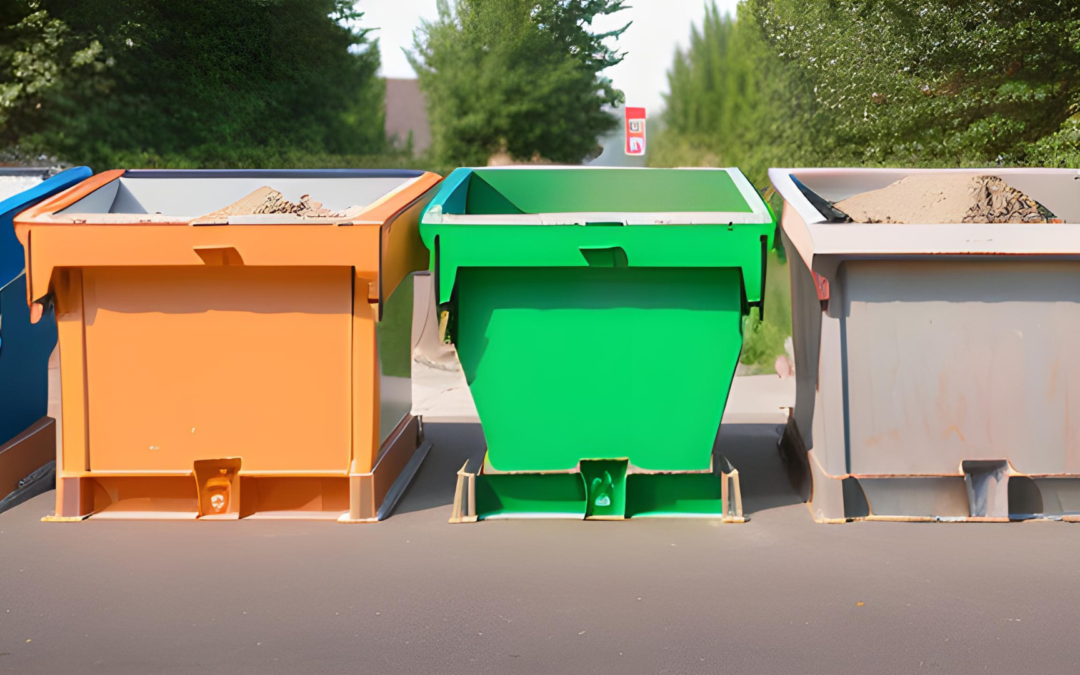A dumpster is a movable waste container designed to be brought and taken away by a special collection vehicle, or to a bin that a specially designed garbage truck lifts, empties into its hopper, and lowers, on the spot. The word is a generic trademark of Dumpster, an American brand name for a specific design. Generic usage of skip, or wheelie bin may be used in other English-speaking countries.
History
The word “dumpster”, first used commercially in 1936, came from the Dempster-Dumpster system of mechanically loading the contents of standardized containers onto garbage trucks, which was patented by the Dumpmaster Brothers in 1935. The containers were called Dumpsters, a blending of the company’s name with the word dump. The Dempster Dumpmaster, which became the first successful front-loading garbage truck that used this system, popularized the word.
The word dumpster has had at least three trademarks associated with it by Dempster Brothers, but today it is often used as a genericized trademark. All three trademarks have either expired or canceled.
A dumpster is sometimes considered synonymous with a skip. However, there are functional differences between them. A skip is intended to be loaded onto a vehicle and transported to another location. Dumpsters, on the other hand, have their contents emptied into a special vehicle and are seldom moved from their locations.
Function
The main purpose of a dumpster is to store garbage until it is emptied by a garbage truck for disposal. Dumpsters can be used for all kinds of waste, or recycling purposes.
Most dumpsters are emptied by front-loading garbage trucks. These trucks have large prongs on the front which are aligned and inserted into arms or slots on the dumpster. Hydraulics lift the prongs and the dumpster, eventually flipping the dumpster upside-down and emptying its contents into the garbage truck’s hopper (storage compartment). Other dumpsters are smaller and are emptied by rear-loading trucks. Dumpsters are typically emptied outside of peak traffic hours. The frequency at which dumpsters are emptied varies from community to community, often ranging from daily to weekly, depending on the volume of trash generated.
Types
Many businesses, apartment buildings, schools, offices, and industrial sites have one or more dumpsters, generally ranging from 0.5 to 8 cubic yards (0.38 to 6.12 m3), to store the waste that they generate.
Waste storage containers can be made from a wide variety of materials, including steel and fiberglass. Plastic dumpsters became available in the 1970s.
In the United States, 96-US-gallon (0.36 m3) dumpsters (also known as “roll carts” or “toters”) are used by small businesses and homes where a normal bin would be too small, but a regular dumpster would be too large. These are emptied by rear-loading trucks or by side-loading trucks purpose-built for emptying roll carts of this and smaller sizes.
Roll-offs, sometimes called roll-off dumpsters or containers or open-top dumpsters or containers, are larger dumpster trailers ranging from 10 to 45 cubic yards (7.6 to 34.4 m3) and are used at demolition sites, clean-outs, renovations, construction sites, factories, and large businesses. These containers are normally carried by very large trucks with hydraulic arms which load and unload the containers with ease, thus allowing these trucks to place these containers in a relatively unobtrusive position.
Roll-off dumpsters are available in a variety of sizes to fit different situations. The size needed will generally depend on three factors: volume of material, type of material, and location or placement of the dumpster. For example, heavy materials like bricks or stones should be placed in smaller dumpsters so the loaded container does not exceed weight limits for transportation.
Sizes
When choosing a dumpster service for long-term use, you have several things to consider – recycling options, reuse methods, contract terms, equipment needed, and pricing. Dumpster sizes and dimensions will vary according to the manufacturer.
Commercial Dumpster Sizes:
2 Cubic Yard
-Ideal for small to medium businesses or for areas with tight spaces.
-6′ wide x 3′ deep x 3′ tall*.
-Holds roughly 30 kitchen-sized (13-gallon) trash bags.
3 Cubic Yard
-Ideal for small to medium businesses or for areas with tight spaces.
-6′ wide x 4′ deep x 4′ tall*.
-Holds roughly 45 kitchen-sized (13 gallons) trash bags.
4 Cubic Yard
-Ideal for medium-sized businesses or high-volume small businesses such as gas stations, convenience stores, or stores in a shopping mall.
-6′ wide x 5.5′ deep x 4′ tall in the front slanting to 5′ tall in the back*.
-Holds roughly 60 kitchen-sized (13-gallon) trash bags.
6 Cubic Yard
-Ideal for large businesses, shopping malls, or high-volume medium businesses like restaurants.
-6′ wide x 6′ Deep x 4′ tall in the front slanting to 5′ tall in the back*.
-Holds roughly 90 kitchen-sized (13 gallons) trash bags.
8 Cubic Yard
-Ideal for large businesses, shopping malls, or high-volume medium businesses like restaurants.
-6′ wide x 6.5′ deep x 4′ tall in the front slanting to 6.5′ tall in the back*.
-Holds roughly 120 kitchen-sized (13 gallons) trash bags.
Roll-Off Dumpster Sizes:
10-15 Cubic Yard.
-Ideal for small construction, renovation, or landscaping projects.
-15′-20′ long x 8′ wide x 3′ tall*.
-Open top holds about 5-6 pickup truck loads.
20 Cubic Yard
-Ideal for small to medium construction projects or garage clean-outs.
-20′ long x 8′ wide x 4′ tall*.
-Open top holds about 10 pickup truckloads.
30 Cubic Yard
-Ideal for commercial construction, large residential renovations, or large cleanouts.
-20′ long x 8′ wide x 6′ tall*.
-Open top holds about 15 pickup truckloads.
40 Cubic Yard
-Ideal for large construction jobs, new home construction, or large clean-out projects.
-20′ long x 8″ wide x 8″ tall*.
-Open top holds about 20 pickup truckloads.
Best dumpster rental in Louisville. Quick service, easy to work with, and affordable!


Recent Comments